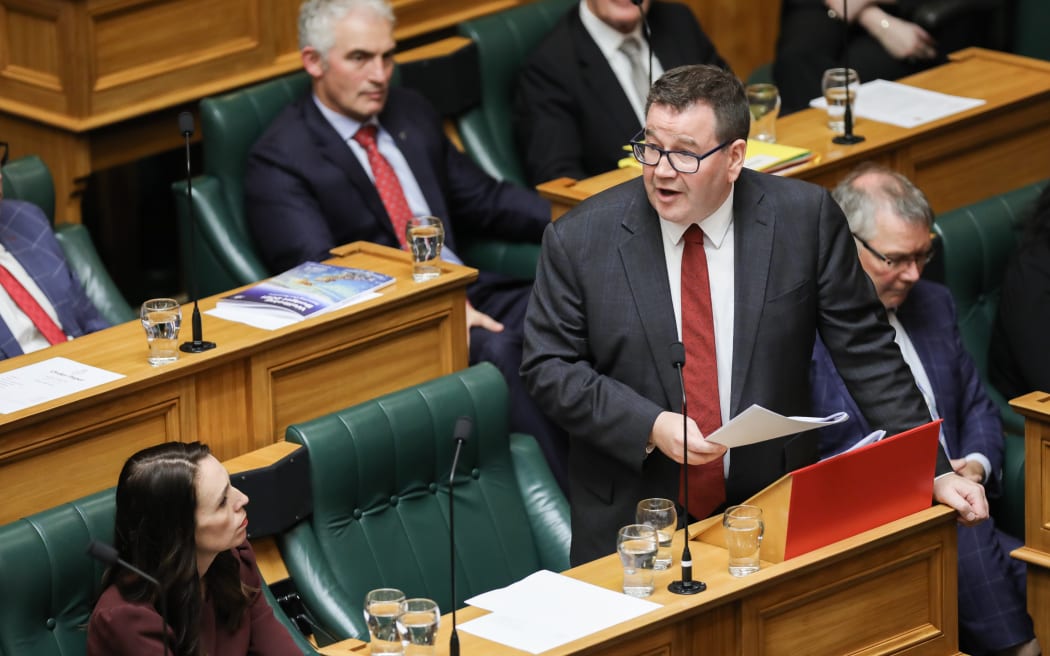It’s Budget week at Parliament. It’s not the only thing happening but it gets all the attention. It's a pretty odd week in many ways and you may wonder why it happens like it does.
So here are a few pointers on how it happens and some reasons why that may be.

Grant Robertson gives the Budget speech Photo: ©VNP / Phil Smith
Why is it usually announced on the last sitting day of the week?
You might think it would make more sense to begin Parliament’s week by announcing the Budget and then spending the rest of the week debating it. But it is typically announced on the final afternoon. Why?
One key reason for this is to leave the rest of the week for the many pre-Budget announcements. Budget week is thick with photo opportunities, events to tease out key messages, speeches and events. It is a real opportunity for any government to sell what they are trying to achieve.
Once the Budget has been announced governments lose some control of the messaging, but they can limit their opponents’ opportunities.
For example, Question Time is done for the week by the time the numbers are announced.
Why is it usually announced on the very last day of a sitting block?
The above applies to this question, but with the addition of allowing governing party MPs to return to their many electorates to campaign on the Budget announcements in their own localities.
And yes, it also lengthens the pause before oppositions get a formal crack at the plan in the House.
And no, none of this is the result of fiendish plotting by the current government. This is how it is almost always done.

Photo: 123RF
Why is the Budget debate always adjourned for urgent legislation?
There is almost always urgency accorded a couple of hours after the Budget is announced.
This typically happens immediately after the various party leaders have made their speeches in response to the Budget (five people with 20 minutes each).
It works like this: Thursdays at Parliament usually end at 5pm to allow far flung MPs to return to their families, but in Budget weeks the House tends to sit Thursday evening (until 10pm), and again from 9am on Friday morning. If it hasn’t got through the urgent bills by midnight on Friday they come back again and do the same on Saturday. (Because of historical and culturally specific ideas about which days are holy and which are not, the House doesn’t sit on Sundays.)
The legislation that is debated under urgency is usually things that flow from Budget announcements. They don’t always appear incredibly urgent but some may only receive a first reading so that a select committee can get cracking on reviewing them.

Photo: 123rf
Why are the Budget ‘readings’ shuffled and weird?
The budget is legislation like anything else but it doesn’t have the typical debate structure. A typical bill’s reading structure is like this:
- First reading: Is the underlying idea of the bill worth our effort?
- Select Committee Hearings: Public and expert feedback to improve it
- Second reading: Did the committee improve it and is it proving worthy?
- Committee of the Whole: Does it need further tinkering?
- Third reading: Does the final version do what it should and do we like it?
But for the Budget there is no debate on the first reading at all, but instead they move promptly on to the second reading at which point in the House the Finance Minister gives a speech (of unfixed duration) before they get to actual debate. It doesn’t get any more normal after that. Why?
I can think of a few reasons why it makes sense to shuffle and repurpose the readings. I expect there are more besides.
- The Budget is legally required so it’s pointless asking whether to even consider it.
- Budget bills (Appropriations Estimates) aren’t amended. The changes to them that happen as the year goes on are incorporated into other bills for that purpose (the Supplementary Estimates Bill, and later a Confirmation and Validation Bill).
- There being no chance to make changes to the original Budget renders the two amendment stages and the public feedback stage pointless unless MPs repurpose them for something more useful, like quizzing ministers about their Budget plans (which they do).
- Once you get through the extensive questioning of ministers and a few political speeches, the Budget is basically a take it or leave it decision.
- The hearings and debates over the Estimates take months but are just the beginning. The Supplementary Estimates also get a good going over and so too do the final numbers (Confirmation and Validation). Each Budget gets a couple of years worth of focus. It's not like reworking the debate stages gives any government's spending an 'easy ride' in Parliament.


